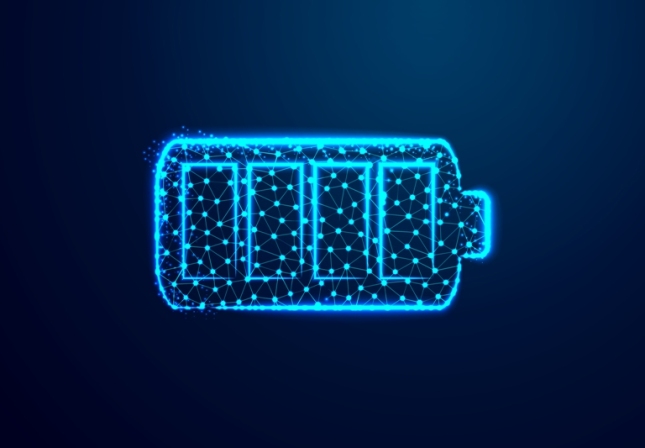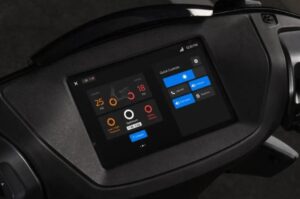
Pharmacy symbols Connection and disconnection concept. lines, triangles and particle style design. Illustration vector
In this modern age, technology has made significant strides, and one of the most innovative creations is the lithium-ion battery. This small device has revolutionized the way we live, powering up our gadgets, cars, and even homes. But how exactly does a Lithium-Ion battery work, and what makes it different from other batteries?
What is Lithium Ion Battery?
Lithium-ion batteries are rechargeable batteries that use lithium ions as their primary component. They are commonly used in a variety of applications, including portable electronic devices, electric vehicles, and grid-scale energy storage systems.
It also consists of one or more cells, each containing a positive electrode, a negative electrode, and an electrolyte solution. During charging, lithium ions move from the positive electrode through the electrolyte solution to the negative electrode, where they are stored. During discharging, the ions move back to the positive electrode, releasing energy that can be used to power a device.
How Lithium Ion Battery Works
Lithium-ion batteries are rechargeable batteries that use lithium ions as the main charge carrier. These batteries consist of two electrodes – a positive electrode (cathode) and a negative electrode (anode) – separated by an electrolyte. When the battery is charged, lithium ions move from the cathode to the anode through the electrolyte. When the battery is discharged, the lithium ions move from the anode to the cathode, producing electrical energy.
Advantages of Lithium-Ion Battery
High Energy Density
Lithium batteries have a higher energy density compared to other batteries, making them more powerful and efficient. This means that they can store more energy in a smaller size and weight, making them an ideal choice for portable devices such as smartphones, laptops, and electric vehicles.
Long Lifespan
Another significant advantage of lithium batteries is their long lifespan. Unlike other batteries that degrade over time, lithium batteries have a longer lifespan, and they can last for up to ten years or more. This makes them a cost-effective solution for many applications, including renewable energy storage systems, emergency power backups, and medical devices.
Fast Charging
Lithium batteries also have the advantage of fast charging. With the advancement of technology, lithium batteries can now charge quickly, making them an ideal choice for electric vehicles and other applications that require fast charging. Moreover, lithium batteries can retain their charge for extended periods, making them ideal for devices that are not used frequently.
Environmental-Friendly
Lithium batteries are also environmentally friendly, as they do not contain hazardous materials such as lead or cadmium. They also have a low self-discharge rate, which means that they can retain their charge for a long time, reducing the need for frequent replacements.
Disadvantages:
- Lithium-ion batteries are more expensive to manufacture compared to other types of batteries.
- They can be sensitive to high temperatures, which can affect their lifespan.
- They have a limited lifespan, after which they need to be replaced.
- They can be dangerous if not handled properly, as they can catch fire or explode.
Lithium-ion Batteries and the Environment
Lithium-ion batteries have become increasingly popular in recent years due to their use in a variety of electronic devices, such as smartphones, laptops, and electric cars. While they offer many benefits, such as high energy density and long lifetimes, there are also concerns about their environmental impact.
The production of lithium-ion batteries requires the extraction of lithium, cobalt, nickel, and other materials, which can have significant environmental impacts. The mining process can cause air and water pollution, soil degradation, and habitat destruction. In addition, the transportation of these materials can also contribute to greenhouse gas emissions and other environmental issues.
Once the batteries are produced, they must be disposed of properly to avoid further environmental damage. If not disposed of correctly, they can release harmful chemicals and heavy metals, such as lead and mercury, into the environment. This can cause soil and water pollution, which can harm plants, animals, and humans.
However, it is also worth noting that lithium-ion batteries can offer some environmental benefits. For example, they can be used to store renewable energy, such as solar or wind power, which can help reduce greenhouse gas emissions from fossil fuel-based power plants. Electric cars powered by lithium-ion batteries can also help reduce emissions from transportation, which is a significant contributor to climate change.
Lithium Ion Batteries and Electric Vehicles
Lithium-ion batteries have become a popular choice for electric vehicles due to their high energy density, long lifespan, and fast charging capabilities.
Compared to traditional lead-acid batteries, lithium-ion batteries can store more energy in a smaller and lighter package, making them an ideal choice for electric vehicles. This allows electric vehicles to have a longer driving range, as well as faster acceleration and more power.
Lithium-ion batteries also have a longer lifespan than lead-acid batteries, which means they do not need to be replaced as often. This can help reduce the overall cost of ownership of electric vehicles.
In addition, the lithium-ion battery can be charged much faster than lead-acid batteries, with some models capable of charging to 80% capacity in less than an hour. This can help reduce the time it takes to charge an electric vehicle and make it more convenient for drivers.
Conclusion:
A lithium-ion battery is a game-changer in the field of energy storage. They offer high energy density, long lifespan, and fast charging capabilities, making them an ideal solution for electric vehicles, portable electronic devices, and stationary energy storage systems. Despite the challenges and limitations of this technology, lithium-ion batteries have already made a significant impact on the energy industry, paving the way for a more sustainable and efficient future.
As research and development continue, it is clear that lithium-ion batteries will play an even greater role in shaping the energy landscape in the years to come. So, let’s embrace this cutting-edge technology and continue to push the boundaries of what is possible with lithium-ion batteries.
Read Next Blog:
Hybrid Vehicles: The Future of Transportation







